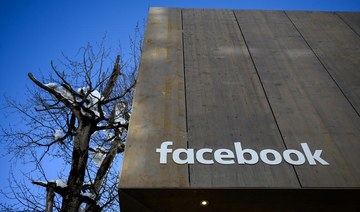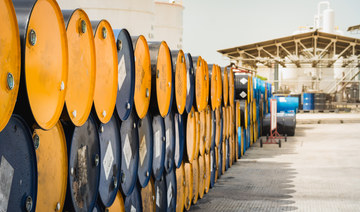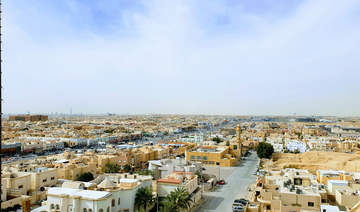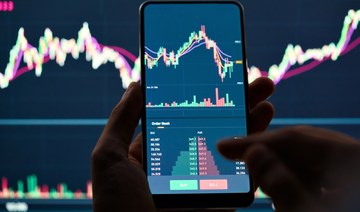CHANTILLY, France: G7 finance ministers will have the growing powers of big digital firms in their sights when they meet on Wednesday outside Paris despite divisions about how best to tax them.
France wants to use its presidency of the two-day meeting in the picturesque chateau town of Chantilly north of Paris to get broad support for ensuring minimum corporate taxation.
G7 governments are concerned that decades-old international tax rules have been pushed to the limit by the emergence of Facebook and Apple, which book profits in low-tax countries regardless of the source of the underlying income.
The issue has become more vexed than ever in recent days as Paris defied US President Donald Trump last week by passing a tax on big digital firms’ revenues in France despite a threat from him to launch a probe that could lead to trade tariffs.
“France is a sovereign nation and will continue of course to decide as a sovereign nation on all taxation issues,” French Finance Minister Bruno Le Maire said at a conference at the French central bank on the eve of the G7 meeting.
“So, let’s work during the G7 ... on that key question of digital taxation because this is for us the best way to fix this issue,” Le Maire added.
Their bilateral dispute aside, France and the United States are in favor of rules ensuring minimum taxation as part of an effort among 139 countries to overhaul international tax rules.
Although a G7 agreement would set the tone for the broader push, an agreement among all of the G7 ministers on a minimum rate or range of rates is likely to prove elusive as Britain and Canada have reservations, a French Finance Ministry source said on Friday.
Common ground should be found more easily among ministers and central bankers present at the meeting on the issue of digital currencies and coins.
Facebook’s recent announcement of plans to launch a digital coin has met with a chorus from regulators, central bankers and governments insisting it must respect anti-money-laundering rules and ensure the security of transactions and user data.
But there are also deeper concerns that the growing powers of big tech companies increasingly encroach on areas belonging to governments, like issuing currency.
“These digital giants are turning into private states – states over which citizens have no control and where democracy has no place,” Le Maire said.
“We cannot let companies, which are serving private interests, gather all the attributes of sovereign states. We must act,” he added.
Off the official agenda, ministers are also due to consult on possible successors to replace Christine Lagarde at the head of the International Monetary Fund.
US Secretary of the Treasury Steven Mnuchin and some European ministers are due to meet with Bank of England Governor Mark Carney, who has been mooted as a possible candidate for the IMF job.
G7 finance ministers look to rein in tech giants at French meeting
G7 finance ministers look to rein in tech giants at French meeting

- Concerns that the growing powers of big tech companies are increasingly encroaching on areas belonging to governments
- ‘These digital giants are turning into private states — states over which citizens have no control and where democracy has no place’
World Bank raises Saudi Arabia’s 2025 GDP growth forecast to 5.9%
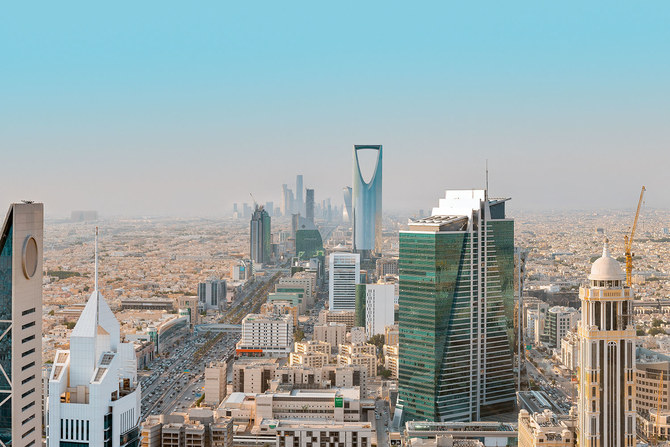
RIYADH: The World Bank has raised its expectations for Saudi Arabia’s economic growth to 5.9 percent in 2025 from 4.2 percent predicted earlier in January.
In its latest report the bank, however, revised its 2024 forecast for the Kingdom’s gross domestic product growth downward to 2.5 percent from an earlier forecast of 4.1 percent.
Concurrently, the overall GDP growth forecast for Gulf Cooperation Council countries in 2024 has been reduced to 2.8 percent, down from 3.6 percent, while the 2025 forecast has been revised to 4.7 percent from 3.8 percent.
The report also adjusted the UAE’s GDP growth forecast to 3.9 percent for 2024, up from the previously projected 3.7 percent, with a further rise to 4.1 percent in 2025, from 3.8 percent.
Kuwait’s economy is expected to expand by 2.8 percent in 2024 and increase further to 3.1 percent in 2025.
Similarly, Bahrain’s economy is likely to grow by 3.5 percent in 2024 and 3.3 percent in 2025, marking an increase from January’s projections.
Meanwhile, Qatar’s economy saw a downward revision for its 2024 forecast from 2.5 percent to 2.1 percent but an upward revision for 2025 from 3.1 percent to 3.2 percent.
Oman’s economy projections for 2024 and 2025 saw a marginal increase of 0.1 percent since the January forecast.
This adjustment reflects the broader economic trends where the surge in oil prices following Russia’s invasion of Ukraine in 2022 bolstered oil-exporting economies in the Middle East and North Africa.
In contrast, economic growth in non-oil-exporting nations — including MENA oil importers like Djibouti, Jordan, Morocco, Tunisia, and the West Bank and Gaza — has slowed.
By 2024, the growth disparity between GCC oil exporters and developing oil importers is expected to narrow to just 0.9 percentage points, marking a significant shift from 2022 when GCC countries grew 5.6 percentage points faster, the report stated.
“Developing oil exporters will grow 2.8 percent in 2024, down from 3.1 percent in 2023 while growth in developing oil importers is forecasted to decrease to 2.5 percent in 2024, down from 3.1 percent in 2023,” the report stated.
Overall, the MENA region is expected to achieve a growth rate of 2.7 percent in 2024, which aligns with pre-COVID levels but still trails the global average.
While other emerging markets and developing economies are also projected to remain below pre-pandemic growth rates, they are expected to surpass the MENA region by 1.2 percentage points in 2024.
GCC oil companies’ capex to grow by 5% to reach $115bn in 2024
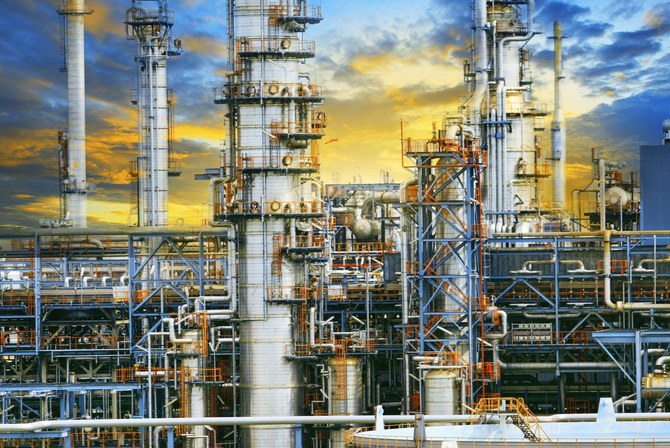
RIYADH: The capital expenditures of national oil companies in the Gulf Cooperation Council are likely to grow by 5 percent in 2024 as compared to the previous year and are expected to reach $115 billion, according to a report.
The analysis by S&P’s Global Ratings, however, does not take into account the potential surge in spending from recent expansion plans such as the North Field West Project in Qatar, which it said could significantly boost expenditures.
The report highlighted that while the growth in capital expenditure is modest, Saudi Arabia’s planned output cuts in line with the current policy of the Organization of the Petroleum Exporting Countries and its allies, known as OPEC+, is likely to decrease demand for drilling platforms, operating ratios, average daily production rates, and profitability among regional drilling companies, especially in the Kingdom.
“We stress-tested the effect of a hypothetical 15-20 percent loss of total rig demand in the region on GCC drillers, and we estimate that the debt to EBITDA (Earnings Before Interest, Taxes, Depreciation, and Amortization) of rated and publicly listed drillers based in GCC countries could increase by about 1x on average,” S&P Global Ratings Credit analyst Rawan Oueidat said.
“At this point, we think that drillers’ rating headroom could shrink, but we don’t expect any short-term rating pressure,” Oueidat added.
The agency also raised concerns about the future of capital expenditure in other oil and gas-producing countries of the GCC, following Saudi Aramco’s decision to suspend its plan to increase the Kingdom’s maximum production capacity.
Despite these concerns, the total oil capital expenditure in the region is expected to remain relatively high due to the ongoing expansion plans in Qatar and the UAE.
However, the pace and magnitude of spending are expected to impact oilfield service companies and the entire value chain, particularly drilling companies whose business models heavily rely on corporate capital expenditures.
The UAE’s Abu Dhabi National Oil Co. is set to increase its oil production capacity to 5 million barrels per day by 2027, up from 4 million bpd as of February 2024, according to the US Energy Information Administration.
Meanwhile, Qatar is aiming to boost its liquefied natural gas production capacity to 142 million tonnes annually by 2030 from the current output of 77 million tonnes.
The report predicted oil prices to average $85 per barrel for the remainder of 2024 and $80 per barrel the following year.
It also suggested that geopolitical tensions and planned production cuts by OPEC+ will support prices and enhance the cash flows of oil companies across the Gulf region.
Saudi housing program Sakani benefits over 32,000 families in Q1

RIYADH: As many as 32,343 Saudi families benefitted from Sakani’s housing options during the first quarter of 2024, marking an annual 15 percent increase.
In collaboration with the Real Estate Development Fund and financial institutions, the program provides a variety of housing support packages to encourage first-time house buyers, including non-refundable financial assistance of SR100,000 ($26,659) or SR150,000.
The number of the Kingdom’s households that purchased their first homes reached 25,391 in the first three months of the year, reflecting the objective of Sakani to offer a variety of residential options and financial solutions.
Founded in 2017 by the Saudi Ministry of Housing and the Real Estate Development Fund, the program aims to increase the proportion of families that own a home in the Kingdom to 70 percent by 2030, in line with the economic diversification strategy Vision 2030.
Figures from Sakani showed that the number of beneficiary households reached 12,184 in March, with 9,381 Saudi families obtaining their first residence.
In January, Sakani announced that more than 100,000 Saudi families benefited from the initiative in 2023, while the number of applicants who obtained their first home over that 12 month period reaching 98,475.
The core objectives of the Sakani initiative are to enable homeownership in the Kingdom by creating new housing stock, assigning plots and properties to citizens, and providing financing for their purchases.
The Sakani website and application provide a wide range of housing facilities and services, such as real estate consultancy, issuance of real estate transaction tax certificates and a display of financing institution rates.
It also provides electronic financing and the disbursement of land contracts, engineering design services, access to certified contractors, and additional services.
Qatar inflation dips 1.4% in March: official data
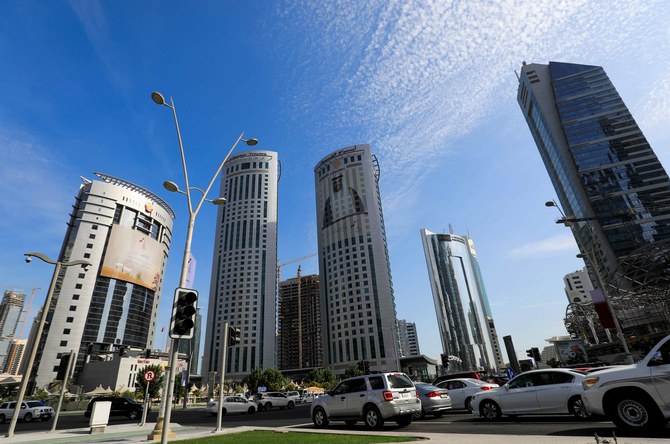
RIYADH: A fall in food and beverage prices helped drive Qatar’s inflation down 1.4 percent in March as compared to the previous month, official data showed.
According to a report released by the country’s Planning and Statistics Authority, the consumer price index reached 106.67 points in March.
Compared to February, expenses for food and beverages slid by 4.74 percent in March. Prices for recreation and culture witnessed a decline of 5.58 percent during the same period.
Similarly, costs for restaurant and hotels, as well as furniture and household equipment, decreased by 1.92 percent and 0.34 percent, respectively, in March compared to the previous month.
On the other hand, prices for clothing and footwear increased by 1.88 percent, followed by expenses for transport, which went up by 0.23 percent.
Cost of healthcare and communication remain unchanged in March, data showed.
However, the Gulf country’s annual consumer price index edge up by 0.98 percent in March compared to the same month of the previous year.
The year-on-year surge in prices was driven by recreation and culture (8.48 percent), communication (3.84 percent), education (3.48 percent), food and beverages (2.73 percent), furniture and household equipment (1.28 percent), and miscellaneous goods and services (0.83 percent).
A year-on-year decrease has been recorded in the prices of clothing and footwear, followed by housing, water, electricity and other fuel.
Qatar’s economy is expected to stabilize in the near future after experiencing a surge in 2022 due to hosting the FIFA World Cup, according to the IMF.
The Washington-based lender has forecasted a 1.9 percent growth in the country’s gross domestic product for 2024.
Highlighting Qatar’s resilience to recent global disturbances, the IMF stated that the country’s economic prospects are promising.
Furthermore, it noted that the Hamas-Israel conflict has not had any discernible impact on Qatar.
“Risks are broadly balanced. Maintaining prudent macroeconomic policy and intensifying reform efforts will support Qatar’s resilience to shocks and accelerate its economic transformation,” the IMF said.
Closing Bell: TASI gains 41 points to close at 12,708, reaches $2.59bn trade volume
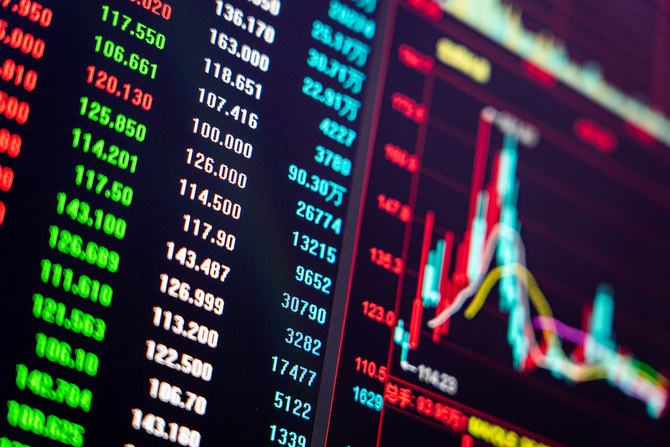
RIYADH: Saudi Arabia’s Tadawul All Share Index closed at 12,708.34 points on Monday, gaining 41.44 points, or 0.33 percent.
The parallel market Nomu also gained 158.48 points, or 0.6 percent, to conclude at 26,548.59.
However, the MSCI Tadawul 30 Index fell 4.77 points – 0.3 percent – to finish at 1,610.23.
The main index posted a trading value of SR9.7 billion ($2.59 billion), with 172 stocks advancing and 54 declining. On the other hand, Nomu reported a trade volume of SR103.7 million.
Saudi Cable Co. was the top performer on TASI as its share price surged 9.89 percent to SR77.80. Saudi Chemical Co. followed next with its share price jumping 7.62 percent to close at SR8.19.
Salama Cooperative Insurance Co. was also among the top performers, climbing 7.19 percent to SR33.55. Al-Etihad Cooperative Insurance Co. and Al Yamamah Steel Industries Co. increased 6.82 and 6.81 percent to SR26.15 and SR42.35, respectively.
Conversely, Saudi Tadawul Group Holding Co. recorded the most significant dip, declining 2.73 percent to SR270.40.
Arabian Internet and Communications Services Co. and the National Co. for Glass Industries also experienced setbacks, with their shares dropping to SR368.20 and SR45.90, reflecting declines of 2.33 and 2.24 percent, respectively. Bupa Arabia for Cooperative Insurance Co. and Saudi Awwal Bank also reported significant losses.
Nomu’s top performer was Abdulaziz and Mansour Ibrahim Albabtin Co., which saw a 9.49 percent jump to SR45. Amwaj International Co. and Meyar Co. also recorded notable gains, with their shares closing at SR55.60 and SR73.90, marking an increase of 8.59 and 5.57 percent, respectively. Alqemam for Computer Systems Co. and Professional Medical Expertise Co. also fared well.
Raoom Trading Co. was the worst performer on the parallel market, declining by 7.72 percent to SR145.80. Other underperformers included Al Mohafaza Co. for Education and Mohammed Hasan AlNaqool Sons Co., whose share prices dropped 4.67 percent and 3.68 percent to SR20.80 and SR44.50, respectively.
Alhasoob Co. and Mulkia Investment Co. declined during the day to settle at SR67.20 and SR34, respectively.



